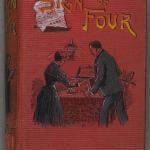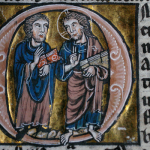In this essay I will talk about G.K. Chesterton and Cheese, the Pulitzer Prize, Lincoln, Bruce Springsteen and America, The latest General Audience from Pope Leo, Talk about new saints, Classic 19th Century Literature the Y.MC.A. and a tip about writing.

“Life moves pretty fast. If you don’t stop and look around once in a while, you could miss it.”
―
National Cheese Day
When I was working at the nursing home yesterday, I gasped when I saw what the Snack of the Day I was supposed to deliver to the residents. It was a ham and cheese mini wrap snack. The girl in charge is very diligent about keeping the mid-day snack on the snack cart in theme for whatever day it might happen to be. For example on some day commemorating some anniversary of Elvis Presley, perhaps his birthday on January 8, the snack of the day was something that had Peanut butter, banana and bacon in it.

Because June 4 is National Cheese Day, the Snack of the Day for the senior residents of the nursing home was that ham and cheese mini wrap snack I just mentioned.
Ode to Cheese
God of the country, bless today Thy cheese,
For which we give Thee thanks on bended knees.
Let them be fat or light, with onions blent,
Shallots, brine, pepper, honey; whether scent
Of sheep or fields is in them, in the yard
Let them, good Lord, at dawn be beaten hard.
And let their edges take on silvery shades
Under the moist red hands of dairymaids;
And, round and greenish, let them go to town
Weighing the shepherd’s folding mantle down;
Whether from Parma or from Jura heights,
Kneaded by august hands of Carmelites,
Stamped with the mitre of a proud abbess.
Flowered with the perfumes of the grass of Bresse,
From hollow Holland, from the Vosges, from Brie,
From Roquefort, Gorgonzola, Italy!
Bless them, good Lord! Bless Stilton’s royal fare,
Red Cheshire, and the tearful cream Gruyère.
FROM JETHRO BITHELL’S TRANSLATION
OF A POEM BY M. Thomas Braun
The Complete Book of Cheese by Bob Brown.
I realized when I saw what day it was, what a wasted opportunity it was not to share an article I had come across by Catholic writer G.K.Chesterton on the subject. So I’ll share it with you all today. We often don’t see the world around us because life is moving so fast. We miss the little things and sometimes the big things as well. Chesterton wrote about big things.
On the third day the friends of Christ coming at daybreak to the place found the grave empty and the stone rolled away. In varying ways they realised the new wonder; but even they hardly realised that the world had died in the night. What they were looking at was the first day of a new creation, with a new heaven and a new earth; and in a semblance of the gardener God walked again in the garden, in the cool not of the evening but the dawn.- The Everlasting Man
And he wrote about smaller things, like
Cheese.
Which turned out to be philosophical as it was humorous.
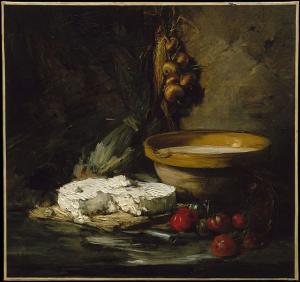
Somebody staring into the sky declared that the moon was made of green cheese. I never could conscientiously accept the full doctrine. I am Modernist in this matter. That the moon is made of cheese I have believed from childhood; and in the course of every month a giant (of my acquaintance) bites a big round piece out of it. This seems to me a doctrine that is above reason, but not contrary to it. But that the cheese is green seems to be in some degree actually contradicted by the senses and the reason; first because if the moon were made of green cheese it would be inhabited; and second because if it were made of green cheese it would be green.
A blue moon is said to be an unusual sight; but I cannot think that a green one is much more common. In fact, I think I have seen the moon looking like every other sort of cheese except a green cheese. I have seen it look exactly like a cream cheese: a circle of warm white upon a warm faint violet sky above a cornfield in Kent. I have seen it look very like a Dutch cheese, rising a dull red copper disk amid masts and dark waters at Honfleur. I have seen it look like an ordinary sensible Cheddar cheese in an ordinary sensible Prussian blue sky; and I have once seen it so naked and ruinous-looking, so strangely lit up, that it looked like a Gruyere cheese, that awful volcanic cheese that has horrible holes in it, as if it had come in boiling unnatural milk from mysterious and unearthly cattle. But I have never yet seen the lunar cheese green; and I incline to the opinion that the moon is not old enough. The moon, like everything else, will ripen by the end of the world; and in the last days we shall see it taking on those volcanic sunset colours, and leaping with that enormous and fantastic life. -The Appetite of Earth in Alarms and Discursions
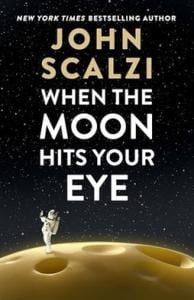
When the Moon Hits Your Eye by John Scalzi.The moon transforms into an unstable organic, cheese-like material, along with all previously retrieved lunar samples. The book follows the diverse human reactions to this possibly apocalyptic event on Earth, day by day, through the course of a whole lunar cycle, with each day presented from the viewpoint of a different character.
More Chesterton on Cheese
My forthcoming work in five volumes, “The Neglect of Cheese in European Literature” is a work of such unprecedented and laborious detail that it is doubtful if I shall live to finish it. Some overflowings from such a fountain of information may therefore be permitted to sprinkle these pages. I cannot yet wholly explain the neglect to which I refer. Poets have been mysteriously silent on the subject of cheese. Virgil, if I remember right, refers to it several times, but with too much Roman restraint. He does not let himself go on cheese. The only other poet I can think of just now who seems to have had some sensibility on the point was the nameless author of the nursery rhyme which says: “If all the trees were bread and cheese”—which is, indeed a rich and gigantic vision of the higher gluttony.
If all the trees were bread and cheese there would be considerable deforestation in any part of England where I was living. Wild and wide woodlands would reel and fade before me as rapidly as they ran after Orpheus. Except Virgil and this anonymous rhymer, I can recall no verse about cheese. Yet it has every quality which we require in exalted poetry. It is a short, strong word; it rhymes to “breeze” and “seas” (an essential point); that it is emphatic in sound is admitted even by the civilization of the modern cities. For their citizens, with no apparent intention except emphasis, will often say, “Cheese it!” or even “Quite the cheese.” The substance itself is imaginative. It is ancient—sometimes in the individual case, always in the type and custom. It is simple, being directly derived from milk, which is one of the ancestral drinks, not lightly to be corrupted with soda-water. You know, I hope (though I myself have only just thought of it), that the four rivers of Eden were milk, water, wine, and ale. Aerated waters only appeared after the Fall. -Cheese in Alarms and Discursions
Mr. Max Beerbohm, I remember, professed to understand the first two forms of popular wit, but said that the third quite stumped him. He could not see why there should be anything funny about bad cheese. I can tell him at once. He has missed the idea because it is subtle and philosophical, and he was looking for something ignorant and foolish. Bad cheese is funny because it is (like the foreigner or the man fallen on the pavement) the type of the transition or transgression across a great mystical boundary. Bad cheese symbolises the change from the inorganic to the organic. Bad cheese symbolises the startling prodigy of matter taking on vitality. It symbolises the origin of life itself. And it is only about such solemn matters as the origin of life that the democracy condescends to joke. Thus, for instance, the democracy jokes about marriage, because marriage is a part of mankind. But the democracy would never deign to joke about Free Love, because Free Love is a piece of priggishness.- All Things Considered
Pulitzer Prize Day
Seeing were talking about writing, yesterday on June 4 was when the first Pulitzer Prizes were awarded.
Laura E. Richards, Maude H. Elliott, and Florence Hall received the first Pulitzer for biography (for Julia Ward Howe known for writing the “Battle Hymn of the Republic” as new lyrics to an existing song, and the original 1870 pacifist Mothers’ Day Proclamation).
How I do wish for you this summer. My little place is so green, my flowers so sweet, my strawberries so delicious—the garden produces six quarts or more a day. The cow gives delicious cream. I even make a sort of cream cheese which is not by any means to be despised. Do you eat ricotta nowadays? Chev gave me a little French dessert set yesterday, which made my table look so pretty. White with very rich blue and gold. Oh, but it was bunkum! Dear old Wevie, you must give me one summer, and then I will give you a winter—isn’t that fair?
–The Project Gutenberg eBook of Julia Ward Howe, by Laura E. Richards and Maude Howe Elliot.
Jean Jules Jusserand received the first Pulitzer for history for his work With Americans of Past and Present Days.
On two tragic occasions, at a century’s distance, the fate of the United States has trembled in the balance: would they be a free nation? Would they continue to be one nation? A leader was wanted on both occasions, a very different one in each case. This boon was granted to the American people, who had a Washington when a Washington was needed, and a Lincoln when a Lincoln could save them. Neither would have adequately performed the other’s task. –The Project Gutenberg eBook of With Americans Of Past And Present Days, by J.J. Jusserand.
Herbert B. Swope received the first Pulitzer for journalism for his work for the New York World.
The greatest scarcity is in the supplies of butter, cheese, sugar, cocoa and chocolate, fats, oils, pork, coffee, tea, fruits such as oranges, lemons and bananas, and eggs. There are others, but these are things the average German is accustomed to in plenty, and the lack of that plenty has caused him inconvenience, although not to the extent of threatening his health. Vegetables are to be had in plenty, and so are fruits of the sort that Germany raises or that she can draw from her Southern allies, such as apples, melons, pears, grapes, and the like. Every great staple of life is to be obtained only by a card. One must have cards for bread, butter, meat, fruits, potatoes, fats, sugar, and recently the system has been extended to include milk, cream, and eggs. One may have meat only five times a week, butter or fats only twice a week, and in the beginning of October the empire went on a one- egg-a-person-per-week basis. This was for the purpose of building up a reserve stock of eggs, which up to that time had been purchasable without restriction. Bread, vegetables, and fish were to be had every day. –Inside the German Empire in the Third Year of the War (1916)
Born in the U.S.A.
Born in the U.S.A. is is the seventh studio album by the American singer-songwriter Bruce Springsteen, released on June 4, 1984, by Columbia Records. All seven of its singles, including “Dancing in the Dark“, “Born in the U.S.A.“, “I’m on Fire“, and “Glory Days“, reached the U.S. top ten. The album has sold over 30 million copies worldwide, making it Springsteen’s best-selling album and one of the best-selling albums of all time.
Work In His Vineyard
All these people, Chesterton, the Pulitzer Prize writers, Springsteen and the people below all have one thing in common. They worked to get the writing that you are reading.
In yesterday’s general audience Pope Leo had this to say about getting to work in the vineyard of the Lord
My dear brothers and sisters: In our continuing catechesis on the Jubilee theme of “Jesus Christ our Hope”, today we reflect on Jesus’ parable of the workers of the last hour (Mt 20:1-16). The landowner who gives the same wage even to the workers of the eleventh hour is an image of God our Father, who constantly goes out to seek those who come to him. His love and generosity abundantly rewards those who, however late, respond to his invitation to share in his kingdom of full and eternal life. God never gives up on us; he is always ready to accept us and give meaning and hope to our lives, however hopeless our situation may seem and however insignificant our merits may appear. I would like to say, especially to the young, do not wait, but respond enthusiastically to the Lord who calls us to work in his vineyard. Do not delay, roll up your sleeves, because the Lord is generous and you will not be disappointed! Working in his vineyard, you will find an answer to that profound question you carry within you: what is the meaning of my life?
–General Audience of 4 June 2025 –
A good example of individuals working in the vineyard of the Lord are the 8 blesseds scheduled to be elevated to the altars. Were still waiting at this time for the rescheduling of the canonization of Blessed Carlo Acutis.
Sadly on this day I’m going to a celebration for life for my ex-bosses husband who died recently from cancer. Please keep Lisa’s husband Anthony Corsi in your prayers.
May his soul and all the souls of the faithful departed Rest in Peace.
Obituary information for Anthony Peter Corsi
Uncle Tom’s Cabin
Today on June 5 Harriet Beecher Stowe‘s anti-slavery serial, Uncle Tom’s Cabin, or Life Among the Lowly, starts a ten-month run in the National Era abolitionist newspaper.
“Of course, in a novel, people’s hearts break, and they die, and that is the end of it; and in a story this is very convenient. But in real life we do not die when all that makes life bright dies to us. There is a most busy and important round of eating, drinking, dressing, walking, visiting, buying, selling, talking, reading, and all that makes up what is commonly called living, yet to be gone through…
The old kitchen floor never seems stained or spotted; the tables, the chairs, and the various cooking utensils, never seem deranged or disordered; though three and sometimes four meals a day are got there, though the family washing and ironing is there performed, and though pounds of butter and cheese are in some silent and mysterious manner there brought into existence.
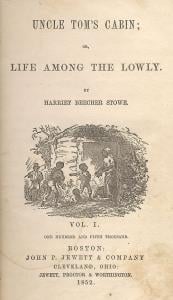
Please Note some descriptions are taken from Wikipedia.
Y.M.C.A
Here is a writing tip for would be writers reading this. Look at the news of the day and yesterday and you will come up with topics to write about for your blog. Just stop and slow down and don’t miss life happening all around you.
In 1844 on June 6 (Tomorow) The Young Men’s Christian Association (YMCA) was founded in London.


